Studies
The following is part of our project “Increasing Access to Justice for Older Adult Victims of Sexual Assault: A Capacity Building Approach”, funded by the Justice Canada Victims Fund.Learn more about this project or consult the full list of resources
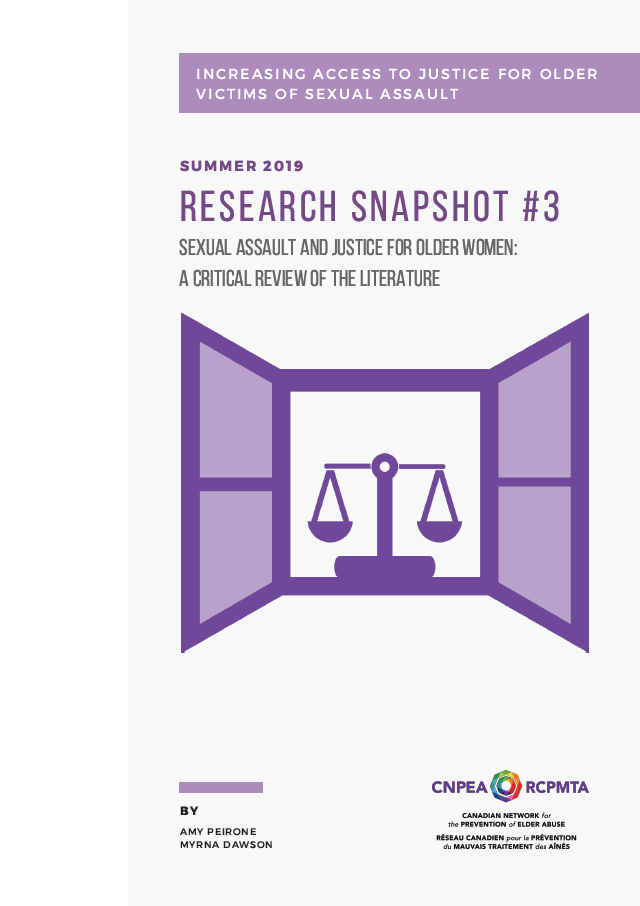 This is the third in a series of Research Snapshots which are being produced for the CNPEA's Access to Justice for Older Victims of Sexual Assault project. Each Snapshot features a relevant research study or resource from Canada or emerging topics that have been identified in other countries.
This is the third in a series of Research Snapshots which are being produced for the CNPEA's Access to Justice for Older Victims of Sexual Assault project. Each Snapshot features a relevant research study or resource from Canada or emerging topics that have been identified in other countries.
Snapshot #3 summarizes a critical review of the current knowledge base and literature on the sexual assault of older women. It presents a brief synopsis of some of the author's key findings and discussion points, with an emphasis on the gaps in our understanding and suggestions for future research.
Article Citation: Fileborn, B. (2016). Sexual assault and justice for older women: A critical review of the literature.Trauma, Violence, & Abuse, 1-12.ext
Authors of the snapshot: Amy Peirone and Myrna Dawson
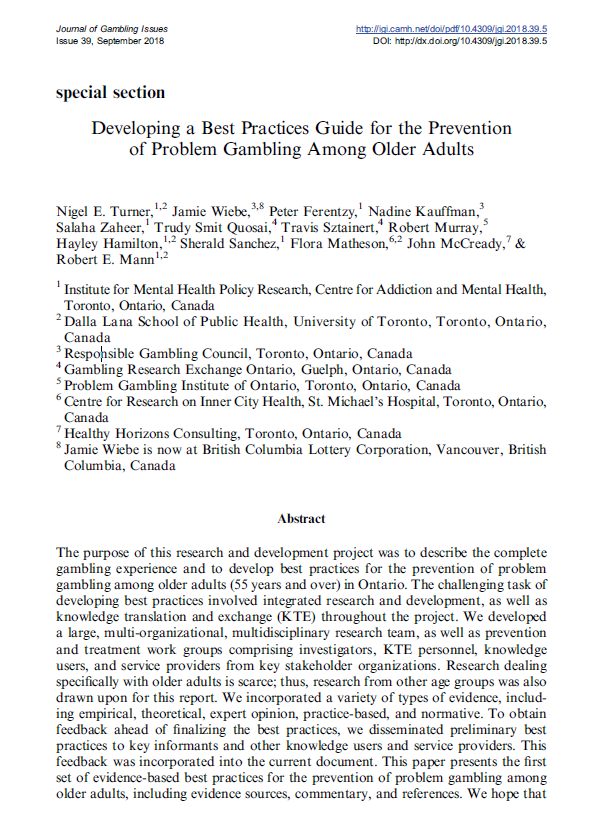 The purpose of this research and development project was to describe the complete gambling experience and to develop best practices for the prevention of problem gambling among older adults (55 years and over) in Ontario. We hope that these best practices help enhance prevention programs, services, and practices. In addition, we hope that this study prompts future research that examines areas that are currently insufficiently researched and helps provoke a dialogue that will lead to a broader knowledge base to guide prevention policies and practices directed at this growing segment of the population.
The purpose of this research and development project was to describe the complete gambling experience and to develop best practices for the prevention of problem gambling among older adults (55 years and over) in Ontario. We hope that these best practices help enhance prevention programs, services, and practices. In addition, we hope that this study prompts future research that examines areas that are currently insufficiently researched and helps provoke a dialogue that will lead to a broader knowledge base to guide prevention policies and practices directed at this growing segment of the population.
Publisher: Centre for Addiction and Mental Health
Journal of Gambling Issues
Issue 39, September 2018
Authors: Nigel E. Turner, Jamie Wiebe, Peter Ferentzy, Nadine Kauffman, Salaha Zaheer, Trudy Smit Quosai, Travis Sztainert, Robert Murray, Hayley Hamilton, Sherald Sanchez, Flora Matheson, John McCready, Robert E. Mann
Source: Journal of Gambling Issues
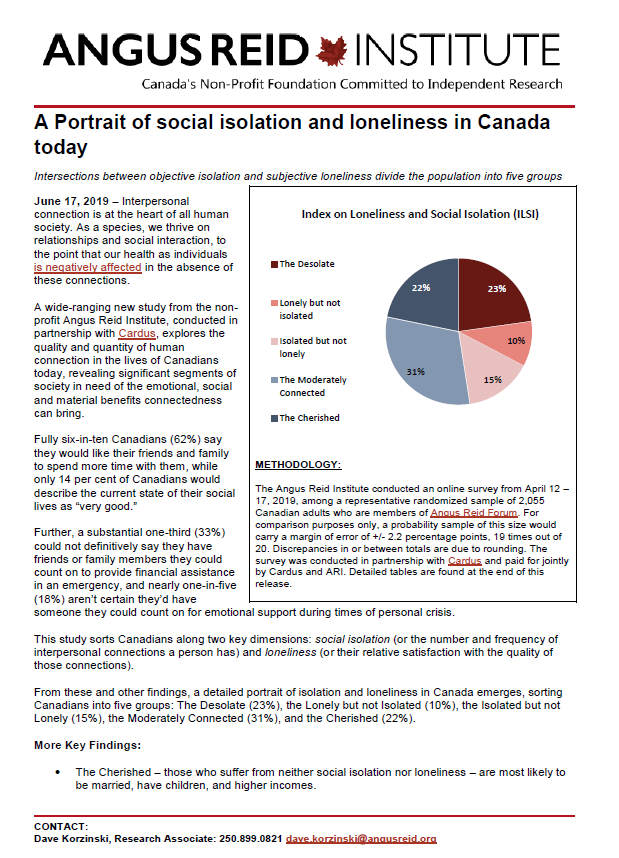 "A wide-ranging new study from the nonprofit Angus Reid Institute, conducted in partnership with Cardus, explores the quality and quantity of human connection in the lives of Canadians today, revealing significant segments of society in need of the emotional, social and material benefits connectedness can bring.
"A wide-ranging new study from the nonprofit Angus Reid Institute, conducted in partnership with Cardus, explores the quality and quantity of human connection in the lives of Canadians today, revealing significant segments of society in need of the emotional, social and material benefits connectedness can bring.
This study sorts Canadians along two key dimensions: social isolation (or the number and frequency of interpersonal connections a person has) and loneliness (or their relative satisfaction with the quality of those connections). From these and other findings, a detailed portrait of isolation and loneliness in Canada emerges, sorting Canadians into five groups: The Desolate (23%), the Lonely but not Isolated (10%), the Isolated but not Lonely (15%), the Moderately Connected (31%), and the Cherished (22%).
Content:
Part 1: What are social isolation and loneliness?
Part 2: The Index of Loneliness and Social Isolation (ILSI)
Part 3: Key Takeaways from the ILSI
Part 4: SolutionsPart 4: Solutions• Introvert or extrovert?• Does technology help?• Most want more time with friends and family"
Source: Angus Reid Institute
The following is part of our project “Increasing Access to Justice for Older Adult Victims of Sexual Assault: A Capacity Building Approach”, funded by the Justice Canada Victims Fund.Learn more about this project or consult the full list of resources
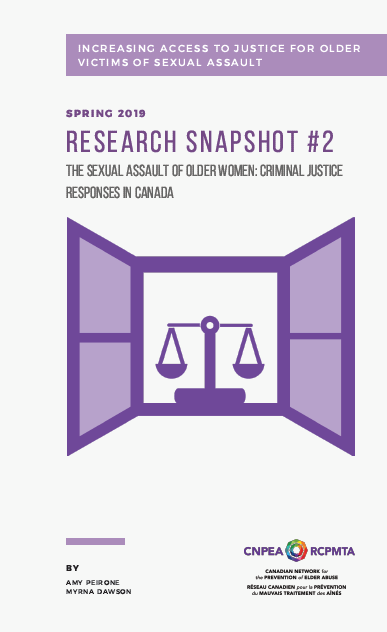
Snapshot #2 summarizes research on criminal justice responses to the sexual assault of older women in Canada
Article Citation: Grant, I., & Benedet, J. (2016). The Sexual Assault of Older Women: Criminal Justice Responses in Canada.
McGill Law Journal, 62(1), 41-78.
Authors of the snapshot: Amy Peirone and Myrna Dawson
The following is part of our project “Increasing Access to Justice for Older Adult Victims of Sexual Assault: A Capacity Building Approach”, funded by the Justice Canada Victims Fund.Learn more about this project or consult the full list of resources
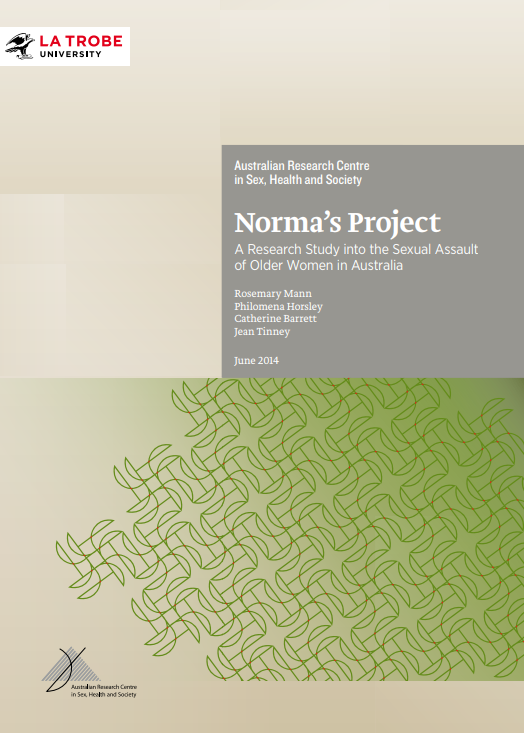
''Daily, the Australian community is becoming more aware of the extent of sexual violence against women. Until recently the prevalence and circumstances of these crimes went mainly unrecognised, and thus, unaddressed. More recently, community bodies, government agencies and departments, carers and women’s groups have mounted extensive campaigns against these terrible actions. But the circumstances of very old victims have remained to a large extent, hidden. Sexual violence against any woman is intolerable, but sexual violence against frail, very old women, be they living in residential aged care, or receiving care at home, constitute the worst cases of this abominable crime. Frail older women, often suffering dementia, have no defences against the perpetrators. Sometimes, the perpetrators are in fact the very people charged with care of the older women. The situation of these older abused women is especially damaging when they are unable to describe what has happened to them, or identify their attacker so that criminal process can be set in train.''
Source: The Opal Institute
Page 4 of 8

















